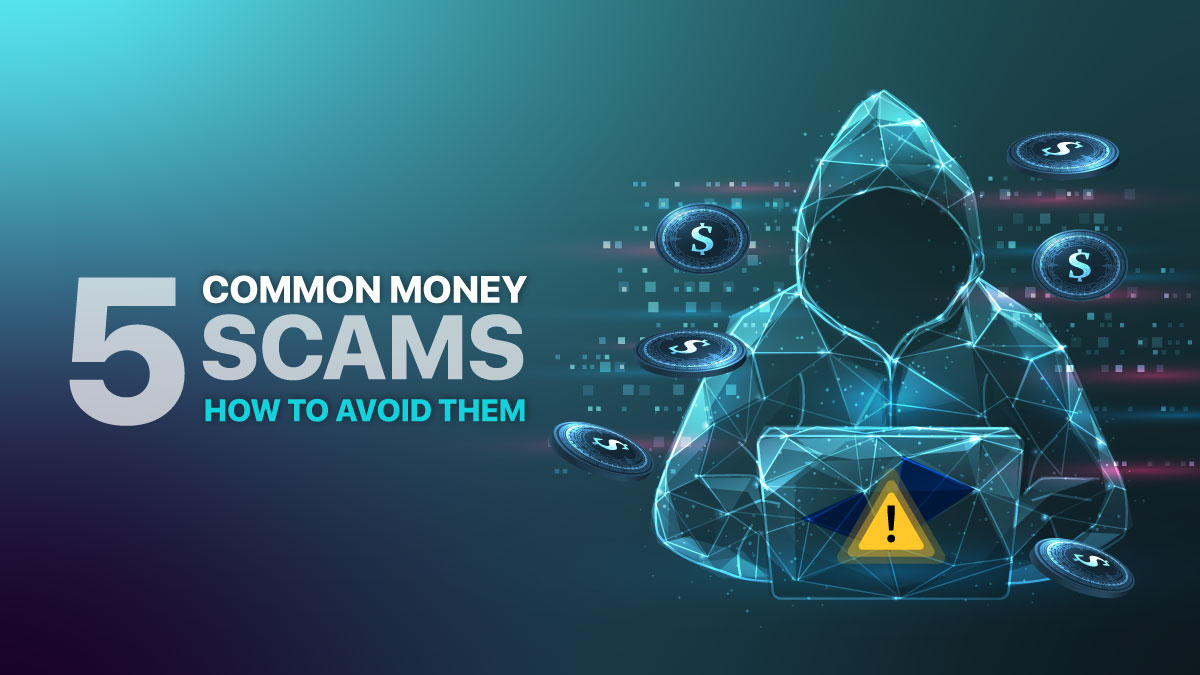
Online money scams have grown in sophistication and prevail our modern, digitalised world. Every 1 in 5 people have experienced one, and no one is immune.
Today, we can do everything online – our shopping, banking, and social networking. This gives scammers various opportunities to attack their unsuspecting victims.
This article provides an overview of the five most common online money scams and offers tips on how to avoid them.
 1. Online shopping scams.
1. Online shopping scams.
Online shopping scams involve fraudulent websites or sellers that offer products at extremely cheap prices. Don’t be tempted for what you’ll receive, if anything at all, would be fake.
How to identify:
- Too Good to Be True Offers: Highly reduced prices or extreme discounts on popular products can be a warning red flag.
- No Contact Information: Scammers usually don’t provide clear contact information or customer service.
- Awful Website Design: This can include misspellings, broken links, and unprofessional design.
- No Reviews or Fake Reviews: A very high number of only positive reviews, generic review count, or absent authentic client feedback.
- Similar URLs: Hackers can establish very similar URL address to the legitimate one. The difference comes from a few letters or words, which can escape the attention of the customer.
How to Avoid:
- Research the Seller: Try to search for information, reviews, and ratings for the company on independent websites.
- Use Secure Payment Methods: Choose secure payment options like credit cards, or reliable online payment providers such as PayPal.
- Check for SSL Certification: Ensure that the website uses HTTPS and has security certifications.

2. Tech Support Scams.
That’s when scammers pretend to be well-known company representatives and reach out to you with urgent problems. Something needs to be fixed and they need your cooperation. The tech support scams have increased to a record number of 32.5K victims per year.
How to identify:
- Unauthorised Calls or Pop-ups: Trustworthy tech providers don’t call people in an attempt to resolve problems.
- Request for Remote Access: Scammers may ask you to provide them with access to your computer so they can “fix” your problem.
- Payment Requests: Often, fraudsters can ask you for money in exchange for a service that is not needed in the first place.
How to Avoid:
- Hang-up: If you ever receive a suspicious call, the best thing to do is to end it.
- Do Not Grant Access: Don’t allow remote access to your personal computer, unless you have requested it and you are 100% confident in the person’s legitimacy.
- Contact Official Support: Always look up the verified contact details to get in touch with the official tech support.

3. Investment scams.
Investment scams trap individuals into fake opportunities, by offering large returns with little to no risk. Got your attention? Well, it did fool 33% of all investors in 2023. Quite the online money scam!
How to identify:
- High Returns, Low Risk: Promises of unbelievably high, guaranteed returns with minimal risk are usually the best alert.
- Pressure Tactics: Scammers force victims to make quick and not well-thought-out decisions, offering limited-time opportunities.
- Lack of Registration: Legitimate and trustworthy investment companies are registered with financial regulatory authorities on file. Scammers usually don’t provide such registration.
How to Avoid:
- Do Your Research: Read and research the investment company’s history. Verify registration with financial authorities.
- Be Skeptical: Be aware of any kind of investment that guarantees returns.
- Seek Professional Advice: Consult with a licensed financial advisor, before making any financial decisions.

4. Romance scams.
Romance scams have become extremely popular. I guess we’re all thirsty for love! They involve scammers creating fake profiles on dating apps and social media channels, in order to establish love connections with their victims and eventually use them for financial obligations. In 2022, about 70,000 Americans were involved in a $1.3 billion romance scam.
How to identify:
- Rapid Intimacy: Scammers quickly profess love and escalate the relationship.
- Excuses to Avoid Meetings: Scammers always have excuses for not meeting with the victims in person, or even via video call.
- Requests for Money: Eventually, they ask for money due to some made-up stories and fake emergencies.
How to Avoid:
- Be Cautious with Personal Information: Don’t share too much personal information with people online.
- Research Them: You can easily check their photos and profile details using reverse image searches.
- Never Send Money: Be cautious when it comes to your money. If someone you haven’t met in person asks you for money or bank information online, don’t say a thing.

5. Phishing scams.
The infamous phishing scams refer to fake emails, texts, or even websites that look authentic but not. They’re actually meant to steal personal information and private data. This may include credit card or identity information, or passwords. Statistics show that cybercriminals send 3.4 million emails every day. This is one of the most widespread online money scams.
How to identify:
- Unusual Sender Address: Phishing emails often look like the legitimate ones. You can identify them by taking a closer look at misspellings or extra characters.
- Threatening or Urgent Words: Scammers usually use an aggressive approach to individuals, by creating a sense of urgency, or by threatening to suspend your account because of questionable activity.
- Generic Greetings: Phishing emails refer to you as “Dear User” or “Dear Customer” instead of using your name.
- Suspicious Links: If clicking over a link reveals the URL, you might notice that it appears strange or doesn’t match the purported destination.
How to Avoid:
- Check the Source: Never open attached files or links sent by unknown or questionable users and companies. Go straight to the official and legitimate website, instead.
- Use the Security Website: Install and update anti-virus programs and software on the devices you use.
- Inform Yourself: Keep yourself updated about the most recent and famous phishing schemes and scams, so you can be prepared. You can also check your email for any data breaches for free. This will show you if any unauthorised user has gained access to your personal and confidential information.

General Tips Against Online Money Scams
Let’s see how to best protect yourself from online money scams.
First up, use strong passwords. Creating unique, complex ones with characters, symbols, and numbers. Change them regularly. And, please, make them different for each platform. This will enhances your online safety and protects you from online money scams. pCloud offers a secure password manager, enabling users to log in to different online accounts with a single click. And the built-in password generator gives you the opportunity to create proper passwords.
Next, enable two-factor authentication. This will add an extra layer of security to your accounts. Despite all the measures, always check your bank accounts for suspicious activity. Also, don’t forget to keep your software and systems updated.
And much like your software, you can protect yourself from these common online money scams, by being informed and cautious.
You might also like
Nothing found.